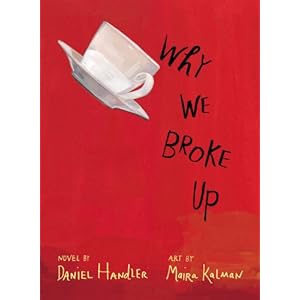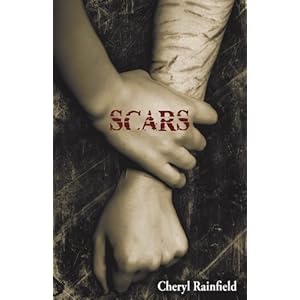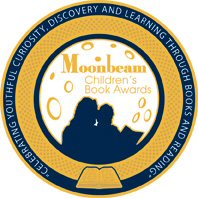Tuesday, June 28, 2011
Tuesday, June 14, 2011
The Why We Broke Up Project
I stumbled across The Why We Broke Up project which is based on the book Why We Broke Up by Daniel Handler AKA Lemony Snicket. According to Handler, "This website allows you to share your stories of heartbreak with us, just as we shared ours with you. Our hope is that the Why We Broke Up project will enable all of our heartbreak to reach critical mass, so that, unlike [name redacted], it will never bother us again."

As soon as I saw Handler's name attached, I knew the book and the project would be as quirky as it is awesome. The illustrations are also awesome, so you just lose. You can read the book, visit the website and share with the world why you broke up with someone... or why they broke up with you! Maybe you broke up with them because they didn't like ketchup on their mac and cheese. Maybe they were a cheating dirtbag, or maybe they were addicted to romantic comedies which you couldn't stand. Maybe they were shallow, or maybe they didn't like books! It doesn't matter, you can commiserate with Handler and Kalman, as well as complete strangers to get all out of your system and move on.

As soon as I saw Handler's name attached, I knew the book and the project would be as quirky as it is awesome. The illustrations are also awesome, so you just lose. You can read the book, visit the website and share with the world why you broke up with someone... or why they broke up with you! Maybe you broke up with them because they didn't like ketchup on their mac and cheese. Maybe they were a cheating dirtbag, or maybe they were addicted to romantic comedies which you couldn't stand. Maybe they were shallow, or maybe they didn't like books! It doesn't matter, you can commiserate with Handler and Kalman, as well as complete strangers to get all out of your system and move on.
Friday, June 10, 2011
Another writer weighs in on YA books
More on the YA question. Just finished reading a short essay by Sherman Alexie on "Why the Best Kids Books are Written in Blood". If you haven't figured out why young people need all sorts of literature, you'll want to check out this poignant essay. And, if you haven't read Alexie, it's not too late! His The Absolutely True Diary of a Part-Time Indian is both dark and funny. It's also brilliant, just like most of his other books.
Dark YA Literature
There has been such an uproar over teen books these days since the WallStreet Journal article that accused YA novels of being "rife with depravity" and "so dark that kidnapping and pederasy and incest and brutal beatings are now just part of the run of things." Everyone has been weighing in, including well known authors like Judy Bloome, Neil Gaiman, and Laurie Halse Anderson. Bloggers have been frenzied in their rebuttals and facebook has been awash with links. Even National Public Radio has weighed in on the subject. Still, some continue to wave the "teen protectionists" flag, which is usually synonymous with book banning. For a balance overview of the controversy, check out Publisher Weekly's "Are Teen Novels Dark and Depraved — or Saving Lives?" by Karen Springen yesterday.
 Personally, I'm of the opinion that YA literature gives a voice to what is sometimes to painful to share. Books about difficult subjects such as: suicide, self-harm, teen prostitution, rape, and addiction are all examples. Authors like Laurie Halse Anderson, Ellen Hopkins, Cheryl Rainfield and others can show you dozens of emails and letters they receive from young people who confirm that reading has saved their lives. Books about real life challenges young people face lets them know that they are not alone; that others have had similar experiences, and that they can survive similar terrible experiences.
Personally, I'm of the opinion that YA literature gives a voice to what is sometimes to painful to share. Books about difficult subjects such as: suicide, self-harm, teen prostitution, rape, and addiction are all examples. Authors like Laurie Halse Anderson, Ellen Hopkins, Cheryl Rainfield and others can show you dozens of emails and letters they receive from young people who confirm that reading has saved their lives. Books about real life challenges young people face lets them know that they are not alone; that others have had similar experiences, and that they can survive similar terrible experiences.
 Books can also be pre-emptive. They can also show a reader the eventual result of taking a certain path without actually having to do so themselves. A realistic book for young people with believable characters about about self-harm, such as Scars by Cheryl Rainfield, or Crank by Ellen Hopkins, may be enough to get a teen to seek help before heading down that path. A book like Speak by Laurie Halse Anderson, may prevent a teen from blaming themselves in the terrible event that they are raped. A book like The Hunger Games by Suzanne Collins, may move young people to think about ways to prevent wars down the road.
Books can also be pre-emptive. They can also show a reader the eventual result of taking a certain path without actually having to do so themselves. A realistic book for young people with believable characters about about self-harm, such as Scars by Cheryl Rainfield, or Crank by Ellen Hopkins, may be enough to get a teen to seek help before heading down that path. A book like Speak by Laurie Halse Anderson, may prevent a teen from blaming themselves in the terrible event that they are raped. A book like The Hunger Games by Suzanne Collins, may move young people to think about ways to prevent wars down the road.
 There are so many positives about realistic teen fiction these days that it's hard to believe this even needs to be discussed. Of course dark books are not for every teen. But they should always be available to those who need or want to read them, especially for those kids whose lives have literally been saved by knowing that they are not alone, and that they have options.
There are so many positives about realistic teen fiction these days that it's hard to believe this even needs to be discussed. Of course dark books are not for every teen. But they should always be available to those who need or want to read them, especially for those kids whose lives have literally been saved by knowing that they are not alone, and that they have options.
 Personally, I'm of the opinion that YA literature gives a voice to what is sometimes to painful to share. Books about difficult subjects such as: suicide, self-harm, teen prostitution, rape, and addiction are all examples. Authors like Laurie Halse Anderson, Ellen Hopkins, Cheryl Rainfield and others can show you dozens of emails and letters they receive from young people who confirm that reading has saved their lives. Books about real life challenges young people face lets them know that they are not alone; that others have had similar experiences, and that they can survive similar terrible experiences.
Personally, I'm of the opinion that YA literature gives a voice to what is sometimes to painful to share. Books about difficult subjects such as: suicide, self-harm, teen prostitution, rape, and addiction are all examples. Authors like Laurie Halse Anderson, Ellen Hopkins, Cheryl Rainfield and others can show you dozens of emails and letters they receive from young people who confirm that reading has saved their lives. Books about real life challenges young people face lets them know that they are not alone; that others have had similar experiences, and that they can survive similar terrible experiences.  Books can also be pre-emptive. They can also show a reader the eventual result of taking a certain path without actually having to do so themselves. A realistic book for young people with believable characters about about self-harm, such as Scars by Cheryl Rainfield, or Crank by Ellen Hopkins, may be enough to get a teen to seek help before heading down that path. A book like Speak by Laurie Halse Anderson, may prevent a teen from blaming themselves in the terrible event that they are raped. A book like The Hunger Games by Suzanne Collins, may move young people to think about ways to prevent wars down the road.
Books can also be pre-emptive. They can also show a reader the eventual result of taking a certain path without actually having to do so themselves. A realistic book for young people with believable characters about about self-harm, such as Scars by Cheryl Rainfield, or Crank by Ellen Hopkins, may be enough to get a teen to seek help before heading down that path. A book like Speak by Laurie Halse Anderson, may prevent a teen from blaming themselves in the terrible event that they are raped. A book like The Hunger Games by Suzanne Collins, may move young people to think about ways to prevent wars down the road.  There are so many positives about realistic teen fiction these days that it's hard to believe this even needs to be discussed. Of course dark books are not for every teen. But they should always be available to those who need or want to read them, especially for those kids whose lives have literally been saved by knowing that they are not alone, and that they have options.
There are so many positives about realistic teen fiction these days that it's hard to believe this even needs to be discussed. Of course dark books are not for every teen. But they should always be available to those who need or want to read them, especially for those kids whose lives have literally been saved by knowing that they are not alone, and that they have options.Tuesday, June 7, 2011
Michael Hauge's 6 stage plot structure
Today I'm trying to apply Michael Hauge's "6 stage plot structure" to the young adult novel I've been working on. He also has a wonderful "Story Concept Template" that I find useful. If you don't know who Michael Hauge is and you have writerly aspirations, you may want to spend a little time on his website. You may even want to order a book or two. This guy is amazing. I took a two day workshop with him, and I would love to do more. He gets right the heart of your writing, doesn't mince words, and he's good. His credentials speak for themselves.
Saturday, June 4, 2011
2011 The Ruth and Sylvia Schwartz Book Awards
The Ruth and Sylvia Schwartz Book Awards have been announced.
Here are this year's winner in the young adult / middle reader category.
To find out more about this Ontario Arts Council Award, check out their site.
Here are this year's winner in the young adult / middle reader category.
YOUNG ADULT / MIDDLE READER AWARDHalf Brother By Kenneth Oppel (Toronto, ON)Published by HarperCollins Publishers Ltd. |
To find out more about this Ontario Arts Council Award, check out their site.
Thursday, June 2, 2011
Author Skype visit
 Image via CrunchBase
Image via CrunchBase
Subscribe to:
Comments (Atom)










